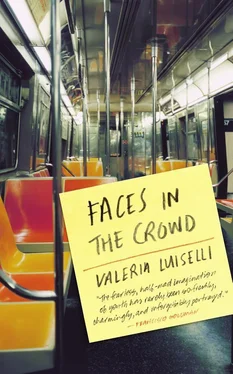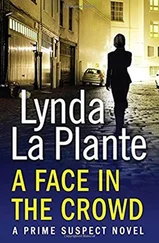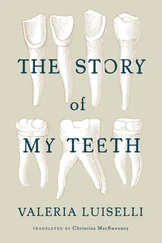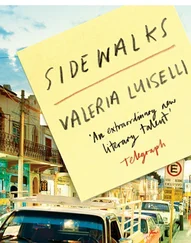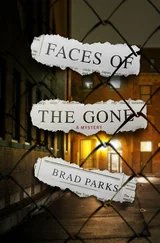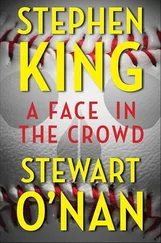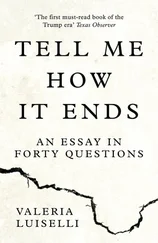*
Dakota moved to her new house at the beginning of summer. It was an apartment in Queens, near a cemetery. The day they handed over the keys we went out to buy three cans of paint. She wanted her whole house to look like Juliet Berto’s cobalt-blue bathroom in Céline et Julie vont en bâteau. We opened all the windows and stripped down to our panties. We painted the bathroom, the kitchen, but only half of the bedroom because we ran out of paint. We painted each other’s nipples cobalt blue. When we’d finished we lay face up on the bedroom floor and lit a cigarette apiece. Dakota suggested we swap panties.
*
Note (Owen to Salvador Novo, Philadelphia, 1949): “Here, in summer, women develop miniature Mount Etnas they call breasts; they’re very unsettling things that sometimes turn out to be what are called ‘cheaters,’ which can be bought in any women’s fashion store.”
*
For the last few days there have been workmen in the house across the street. They’re taking up the old floorboards and replacing them with parquet. They listen to the radio the whole day. That’s how I find out what’s happening in the outside world. There was an earthquake in Asia; sham elections in Nepal; the Mexican army found a mass grave in Tamaulipas with the bodies of seventy-two undocumented Central American migrants. The workmen have sussed out what time I breastfeed the baby, in a rocking chair by the window. They watch me from the roof, lined up like recruits, candidates for a feast to which they won’t be invited. I close the blinds and unbutton my blouse.
*
In the mornings, my husband continues to read what I’ve written the night before. It’s all fiction, I tell him, but he doesn’t believe me.
Weren’t you writing a novel about Owen?
Yes, I say, it’s a book about Gilberto Owen’s ghost.
*
Note (Owen to Josefina Procopio, Philadelphia, 1948): “As this month the fourth was a Sunday, logically tomorrow will be Tuesday the thirteenth and I’m to die on a Tuesday the thirteenth. But if tomorrow isn’t the day, Death will wait for me, or I for her, the appointment won’t be this year. Let’s see what happens.”
*
In One Thousand and One Nights the narrator strings together a series of tales to put off the day of her death. Perhaps a similar but reverse mechanism would work for this story, this death. The narrator discovers that while she is stringing the tale, the mesh of her immediate reality wears thin and breaks. The fiber of fiction begins to modify reality and not vice versa, as it should be. Neither of the two can be sacrificed. The only remedy, the only way to save all the planes of the story, is to close one curtain and open another: lower one blind so you can unbutton your blouse; unwrite a story in one file and construct a different plot in another. Change the characters’ names, remember that everything is or should be fiction. Write what really did happen and what did not. At the end of each day’s work, separate the paragraphs, copy, paste, save; leave only one of the files open so the husband reads it and sates his curiosity to the full. The novel, the other one, is called Philadelphia .
*
This is how it starts: it all happened in another city and another life. It was the summer of 1928. I was working as a clerk in the Mexican consulate in New York, writing official reports on the price of Mexican peanuts on the u.s. market, which was about to crash. Almost twenty-five years have gone by since then; even if I wanted to, I couldn’t write this story as if I still lived there and were that thin young man, full of enthusiasm, translating Dickinson and Williams, wrapped in a gray bathrobe.
(I would have liked to start the way Fitzgerald’s The Crack-Up begins.)
*
My husband has a future life in Philadelphia I know nothing about. A story that perhaps unfolds on the back of his plans. I don’t want to know anything more about it. I’m tortured, irremediably, a priori, by pieces of a life already traced out but not lived, in which there’s a woman, in a house without children, a self-confident criolla, who moans when she fucks. My husband sketches it all out and believes I don’t know.
*
The children live with my ex-wife in New York. I have an apartment and a grave in Philadelphia. She’s a criolla who vamps criollos. Fair-skinned, wealthy. She comes from an old, established Colombian family. I never belonged in that world. My father was an Irish miner who didn’t bequeath me his red hair but did pass on his sense of class resentment and a talent for debauchery. We met in Bogotá, and married there. We had two morganatic children and were, like almost everyone else, unhappy—“largely unhappy,” as the Yankees would elegantly put it. A few years ago we both did a “criollazo.” I lost everything in a Bogotá gaming house. She went off to Manhattan to start a career as a resentful poet. I came to Philadelphia, though I’m not quite sure what I intended to start.
Criollazo: the act of leaving one’s husband in one’s prime, before hitting forty, to dedicate oneself to other women’s husbands. Criollazo: the act of leaving one’s wife, on the threshold of fifty, to dedicate oneself to women without husbands.
*
The problem with criollos, and even more so with criollas, is that they’re convinced they deserve a better life than the one they have. (Note how often a criolla uses the word deserve in any conversation with another criolla.) They firmly believe that inside their head is a diamond someone should discover, polish, and put on a red cushion, so that everyone can be amazed, marvel, understand what they have been missing.
*
I’ve been living in Philadelphia for three years. After a bit of string-pulling in the Foreign Ministry, which I’d prefer not to linger on, I managed to be appointed honorary consul here. It was the only way I had of living near the children. But none of that matters now: I’m going blind, I’m fat, so fat I’ve got tits, sometimes I tremble, perhaps stutter. I’ve got three cats and I’m going to die.
*
The subway, its multiple stops, its breakdowns, its sudden accelerations, its dark zones, could function as the space-time scheme for this other novel.
*
Every fortnight I go to Manhattan to visit the children. Returning, a couple of decades on, to that city where I died so many times has something of a pilgrimage to the cemetery about it, except that instead of taking flowers to a relative or grieving at the grave of an unknown child, I go to meet the men and women I never was but, at the same time, have never been able to stop being.
*
The subway used to bring me close to dead things; to the death of things. One day, when I was traveling home from the south of the city on the 1 line, I saw Owen again. This time it was different. This time it wasn’t an external impression caused by something outside me, like that night in the bar in Harlem, nor a fleeting impression like the time before in the subway, but the stabbing certainty that I was in the presence of something at once beautiful and terrible. I was looking out of the window — nothing except the heavy darkness of the tunnels — when another train approached from behind and for a few moments traveled at the same speed as the one I was on. I saw him sitting in the same position as me, his head resting against the carriage window. And then nothing. His train speeded up and many other bodies, smudged and ghostly, passed before my eyes. When there was once again darkness outside the window, I saw my own blurred image on the glass. But it wasn’t my face; it was my face superimposed on his — as if his reflection had been stamped onto the glass and now I was reflected inside that double trapped on my carriage window.
Читать дальше
